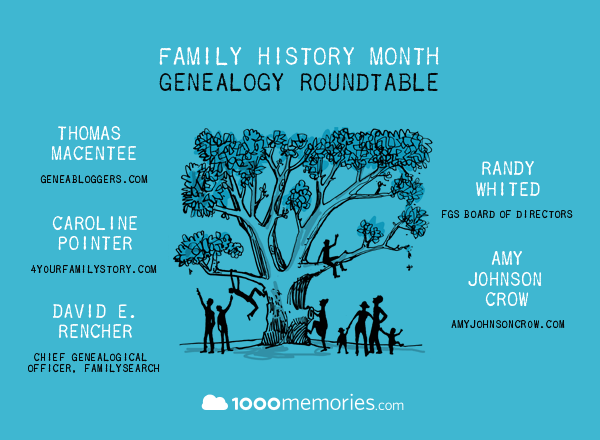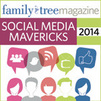|
Over the weekend 1000memories.com shared the results of their recent survey on family history. The survey found that more people than ever are interested in learning about their family history but they (on average) know even less about their genealogy. This week, four of the genealogy community’s top thinkers will share their reactions, starting today with Caroline Pointer.
It’s time to throw away the genealogy rule book. No more of having to be retired or having to be over a certain age to look for who begat you. No more of reading and memorizing a 300-page tome of “More Than You Ever Wanted To Know About Genealogy” before you ever think about “doing” genealogy. No more spending all day in a library (unless you really want to, of course). No more making fun of other people’s family trees located online or offline. After all, right or wrong, they are at least trying. No more dry and boring genealogical and historical society meetings where younger people are not only made to feel unwelcome but discouraged to visit, join, or, heaven forbid, make a suggestion . No more scheduling genealogy-related or family history-related meetings and conferences when those who are employed full-time cannot possibly attend. Basically, no more doing things the same old way just because that’s the way it has always been done. The key to lessening the disparity between those who want to know who their ancestors were and those who actually take steps to learn who their ancestors were is through a combination of education and allowing people to do it on their own terms. It should be goal-based. Perhaps a person’s goal is to learn the medical history of their ancestors. Perhaps another person’s goal is to memorialize a loved one’s life, and yet another person’s goal is to have a complete genealogy that is perfectly sourced. All are equally valuable in their own right as well as possibly valuable to the other. For example, perhaps the person who researches their medical history unknowingly stumbles upon something of value to someone else, and in blogging about it on their non-genealogy or non-family history blog, they unwittingly share it with a family history researcher who needed that information to solve a “brick wall” problem? Likewise, what if the person who memorializes a loved one’s life on say, 1000Memories.com, shares a story of their loved one, and in that story were clues that the genealogical researcher needed to complete their genealogy? Moreover, while a fundamental change is very helpful from the “top down”, it is more practical at a community level. It is important to remove the stigma that genealogy is only for those who are retired. Below are just a few ideas that community groups and organizations should at least take into consideration:
None of the above will matter, though, if we don’t incorporate modern technology into everything we do. It’s the game-changer. Technology can allow younger groups to participate like never before. Just imagine a program where younger people were unleashed in a retirement home, and they captured family stories on Smartphones? How about if they were unleashed in an old forgotten cemetery and with their Smartphones, they captured and uploaded all the photos of and information from the tombstones to an online site? Further, what about all those descendants who have moved from the area that the ancestors once lived in? Are genealogical and historical societies in those areas thinking about programs for these people when they schedule programs? Could they learn how to use webinars and other online tools to reach out to these descendants as well as to the local community? The point is that the genealogy world needs to meet people where they are, assess what those people need, and provide a platform that is inviting and relevant to them. It can’t afford not to do it. Do we really want our descendants sitting around wondering who we were and wondering why we didn’t capture what we could with the technology we had? Do you want to participate in the conversation? 1000Memories invites and encourages you to blog and/or tweet about it. Please send the link to [email protected] or tweet what you think and use the hashtag #familyhistorymonth in the tweet. Next Saturday, 1000memories will publish a summary of all the perspectives and ideas shared. ~Caroline When she’s not suggesting crazy ideas like putting Smartphones into the hands of the young and unleashing them in retirement communities to record family stories, Caroline M. Pointer is recording her own family stories with every tool that she can think of on her personal family history blog, Family Stories. Caroline is a professional genealogist and family historian who enjoys sharing what she’s learned when technology and genealogy collide on her blog, 4YourFamilyStory.com. She has a new blog for beginners and professionals alike launching soon, BloggingGenealogy.com, where she will share about getting more out of genealogy and blogging. Also, she is the In2Genealogy columnist for the E-magazine, Shades of the Departed. Caroline can be reached at CMPointer [AT] gmail [DOT] com. However, most often she can be found on that newfangled social media blue bird site called Twitter at @FamilyStories.
6 Comments
10/18/2011 01:56:32 am
Great post. It's always a balance between providing tools that are approachable by the unwashed masses and trying to maximize quality in research. Certainly better designed software systems play a part, but as you point out, different people have different interests, capabilities and goals. Then creating tools optimized to support those varying factors becomes paramount. Ensuring that resulting data can be shared and validated by others is equally important. This are important drivers in what FamilySearch is doing right now.
Reply
Caroline Pointer
10/18/2011 12:52:27 pm
Thank you, Tom for your insight. I think FamilySearch is moving in the right direction in this respect.
Reply
10/18/2011 01:21:10 pm
Thanks Caroline for a well written post. I think the game is already changing. Gone are the days of books-only research. One would be foolish not to use the tremendous amount of research material available in digital format.
Reply
10/20/2011 01:26:48 am
Caroline -
Reply
Caroline Pointer
10/20/2011 05:18:30 am
Rob, thanks for commenting. I think it's outstanding that your genealogical society has embraced the technological tools that help it to reach as many people as possible. I hope more and more societies follow your example.
Reply
Absolutely wonderful, Caroline! As a homeschooling mom, I've been trying to explain to families for years that family history and genealogy is a way to get kids interested in what some think is a dry subject (though history has always been my favorite. Go figure!) A flat event of dates and facts can come alive when you teach that it was the great-grandmother who traveled with her children alone. It gives flesh and form to the pages of a history book.
Reply
Leave a Reply. |
Categories
All
Archives
February 2017
|
|
© Copyright For Your Family Story 2016 - All Rights Reserved
|


